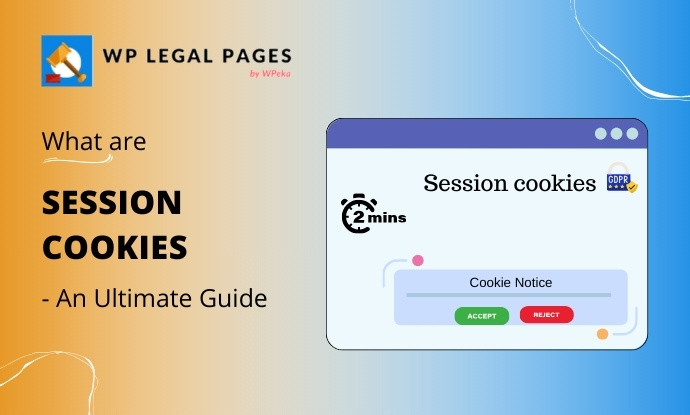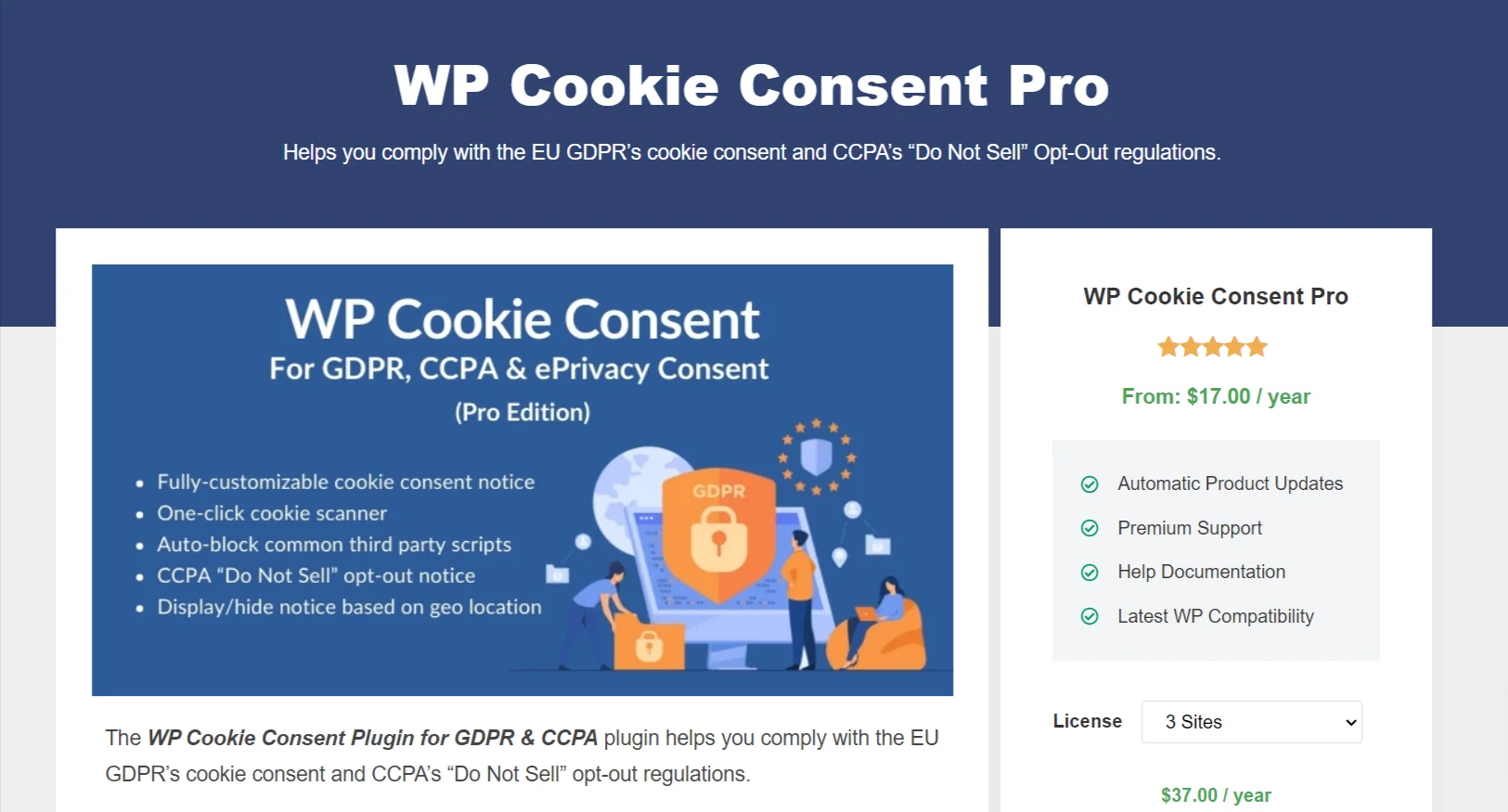What Are Session Cookies? – An Ultimate Guide for 2024

Are you looking to understand the concept of session cookies?
Session cookies are nothing but necessary cookies that last for a session. A session starts when a user opens a browser window and ends when there’s inactivity or when the same user closes the browser window.
Session cookie’s primary purpose is to improve navigation through the website. Each time the user clicks on a website link, the browser requests a web page from the server. Along with the web pages, the server also includes the session cookie files.
The cookie functions as a communication tool between the server and the browser. It indicates which page components have been previously sent to prevent redundant transmissions. Upon the closure of the browser, the associated file is automatically deleted.
Now, having gone through the brief about session cookies, we’ll explore the various aspects involved in the functioning of session cookies.
What are Session Cookies?
A session cookie, often referred to as a transient or temporary cookie, is a small text file that a website places on a visitor’s device during their browsing session.
Unlike persistent cookies, which are stored for a longer duration, session cookies are designed to be temporary and are automatically deleted when the user closes their web browser.
These cookies play a crucial role in tracking real-time changes in user activity, offering a seamless and personalized browsing experience.
An online store is the best example where session cookies are commonly used. During the user’s browsing session, it enables users to add, remove, and modify items in their cart throughout.
They are server-specific and associated with a unique session ID generated by the hosting server. This contributes to the website’s ability to remember user interactions during a single session.
Session cookies are essential for maintaining the continuity of user interactions on a website. For example, on eCommerce platforms, these cookies ensure that products added to the cart remain stored until the user is ready to check out.
This functionality significantly enhances the user experience. It allows them to browse multiple pages, add items to their cart, and make real-time adjustments without losing data.
Persistent Cookies vs Session Cookies
A key distinction in web cookies lies between persistent cookies and session cookies. While both serve the purpose of storing information, they differ in terms of their duration and functionality.
Persistent cookies remain on a user’s device for a specified period, even after the user closes their browser or logs out.
In contrast, session cookies are temporary and are deleted automatically when the browsing session ends. The nature of session cookies limits their accessibility to the device that generated them, enhancing security and privacy.
The unique feature of session cookies lies in their association with a session ID. These ID’s are randomly generated number created by the hosting server. They allow session cookies to track user behavior on a website, helping identify users as they navigate through different pages.
How Do Session Cookies Work?
Session cookies operate within the context of a specific browsing session on a website.
When a user visits a website, the hosting server generates a unique session ID, which is then stored in a session cookie on the user’s device. This session ID serves as a reference point for the server to associate the user’s actions with their specific browsing session.
As the user interacts with the website, the session cookie continuously communicates with the server, updating and storing information about the user’s activity.
One crucial aspect of session cookies is their server-specific nature. Each session cookie is tied to the server that hosts the website, ensuring that it cannot be accessed or read by any other device. This inherent security feature adds a layer of protection to user data.
Also, throughout the browsing session, the session cookie acts as a temporary file of information, facilitating a seamless and personalized user experience.
What is the Purpose of Session Cookies?
The primary purpose of session cookies is to enhance the user experience by providing real-time updates and continuity of interactions during a single browsing session. These cookies play a vital role in scenarios where temporary storage of user data is necessary to facilitate dynamic and personalized content delivery.
You can observe one of the most common applications of session cookies in online shopping carts on eCommerce websites.
Consider a scenario where a user logs into a website. Upon successful authentication, the server generates a unique session ID for that user’s session. This session ID is then stored in a session cookie, which is sent to the user’s browser.
The cookie serves as a form of identification for subsequent requests made by the user. As the user interacts with the website—navigating pages, updating preferences, or adding items to a shopping cart—the session cookie is included in the headers of each request.
On the server side, this session ID is used to retrieve and maintain user-specific data, allowing for a personalized and seamless experience during the user’s visit.
However, when the user decides to log out or if the session expires due to inactivity, the server responds by invalidating the session cookie. This is done by sending a response that clears the session cookie from the user’s browser.
In this way, session cookies play a crucial role in session management and authentication on websites. They enhance security by reducing the need to transmit sensitive information with every request and contribute to a more customized user experience throughout a single browsing session.
Are Session Cookies GDPR Compliant?
Yes, session cookies generally comply with GDPR, as they fall under the category of strictly necessary cookies.
According to data privacy regulations like the General Data Protection Regulation (GDPR), websites do not require explicit user consent to set session cookies on their devices. Strictly necessary cookies are essential for the basic functionality of a website, and their usage is often exempt from the requirement of user consent.
However, while not mandatory, it’s good practice for websites to inform users about the use of session cookies through a cookie policy, privacy policy, or a dedicated cookie consent banner.
How Can I Check If My Website Uses Session Cookies?
A WordPress plugin comes handy when you want to check cookies used by your webite. First, you’ll need to install and activate WP Cookie Consent on your WordPress dashboard.
WP Cookie Consent is a WordPress plugin that helps you create a cookie consent banner for your website. But, apart from the cookie consent banner, it offers multiple exciting features.
Cookie scan is one such amazing feature that helps to scan all the cookies. After successfully scanning your website, you can check all the various cookies that your browser has stored.

FAQ
Session cookies are temporary and deleted at the end of a browsing session, while persistent cookies remain on a user’s device for a predefined period.
Session cookies are crucial for websites to remember your preferences, keep you logged in securely, and ensure a smooth and personalized browsing experience by managing your sessions and maintaining important information during your visit.
Yes, session cookies comply with GDPR, as they are strictly necessary cookies that are essential for the basic functionality of a website.
Conclusion
Session cookies are temporary cookies that are deleted automatically when the browsing session of the user ends.
Session cookies play a major role in enhancing user experiences on websites by enabling continuity during a single browsing session.
Whether in the context of online shopping carts, content personalization, or authentication processes, session cookies contribute to a seamless and efficient interaction between users and websites.
If you’ve liked reading this article, check out our other engaging articles as well:
- Simplified Guide To Set Up Cookie Banners For eCommerce
- How To Add A Cookie Consent Popup To Your WordPress Website?
- What is a Cookie Consent Manager? – An Ultimate Guide
Want a feature like cookie scanning? Grab the WP Cookie Consent plugin now!
